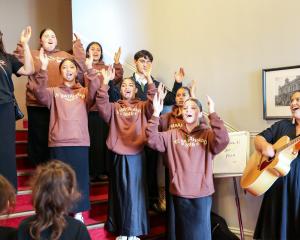
Ms Kaye, who made the announcement during a ''Future of Education'' meeting run by the party and attended by about 30 people at the Mornington Presbyterian Community Centre in Dunedin last night, said political parties should work together to resolve issues affecting the education system.
The meeting followed a similar one in Oamaru yesterday afternoon and is among the first of about 40 to be held around the country, where Ms Kaye is outlining National's education priorities and addressing some of the party's concerns about the Tomorrow's Schools review proposals.
''The strong feedback that I've had so far is . . . [people] want an enduring cross-party agreement for education.
''Where possible, we are absolutely trying to do that.
''If you look at the history in education, you've had quite extraordinary swings back and forth.''
Ms Kaye said a principal told her at a recent meeting there had been more than 30 amendments to the Education Act in the past two decades.
''It's time to be constructive . . . and we're going to do what we can to try and get some enduring agreement in education.''
However, she expressed concern at the high speed at which consultation was taking place on the Tomorrow's Schools review proposals.
The proposals represented the largest education reforms in more than 30 years, and she wanted to ensure more parents, educators and communities had the chance to be heard.
Some at the meeting were sceptical about the proposal to have about 20 new regional education hubs, which would take control of some board of trustees functions.
Many worried that schools might lose control of important decisions such as pupil discipline.
But others liked the idea because it would force schools to work more collaboratively, rather than against each other.
About 25 people attended the party's meeting at the Oamaru Club.
Among concerns aired there was one about the ultimate cost of the education hubs and who they would report to.
Other comments questioned levels of service provided by the Ministry of Education and concerns about NCEA and how it was affecting achievement levels in the classroom.
Further public meetings will be held in Queenstown today (Shotover Primary School, 7pm), Invercargill tomorrow (Windsor Community Church Hall, 4pm), and Stewart Island on Saturday (South Seas Hotel, 10am).
-Additionally reported by Daniel Birchfield














